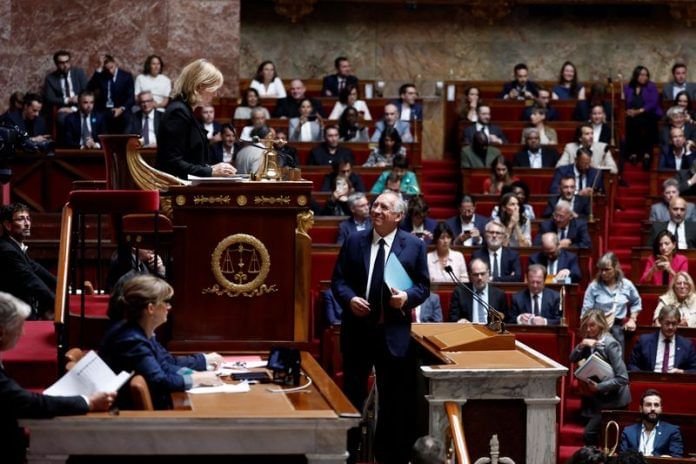By Elizabeth Pineau
PARIS (Reuters) – France’s over-indebtedness is putting its survival at stake, Prime Minister François Bayrou warned ahead of a confidence vote he is expected to lose later on Monday, tipping the euro zone’s second-biggest economy further into crisis.
Bayrou, President Emmanuel Macron’s fourth prime minister in less than two years, called the confidence vote over the acute pressure France is facing to repair its finances, with last year’s deficit nearly double the EU’s 3% limit of economic output and public debt at 113.9% of GDP.
And he warned parliament that any subsequent government will only face the same problems.
“You have the power to bring down the government, but you do not have the power to erase reality. Reality will remain relentless: expenses will continue to rise, and the burden of debt, already unbearable, will grow heavier and more costly,” Bayrou told lawmakers.
Opposition parties have made clear they don’t agree with him on how to tackle the debt, and will vote against Bayrou’s minority government.
“The vital question, the life-or-death question, where our very survival is at stake… is the question of controlling our spending, it’s the question of over-indebtedness,” Bayrou told parliament.
The minority government’s looming collapse looks set to deepen France’s problems at a critical time for Europe, which is seeking unity in the face of Russia’s war against Ukraine, an increasingly dominant China and trade tensions with the United States.
The turmoil also threatens France’s ability to rein in its debt, with the risk of further credit downgrades looming as bond spreads – a gauge of the risk premium investors demand to hold French debt – widen.
Referring to the fact that calling the confidence vote was a risky gamble from the start, Bayrou told parliament: “Our country has an urgent need for lucidity, it has the most urgent need for unity. But it is division that threatens to prevail, that threatens its image and reputation.”
The outcome of the confidence vote, following speeches from Bayrou and leaders from all political groups, may come by around 1700 GMT.
WHAT’S NEXT?
Should Bayrou indeed fall, President Emmanuel Macron will likely face the job of finding yet another government chief capable of steering a budget through parliament, less than a year after the ouster of Bayrou’s conservative predecessor Michel Barnier.
Social tensions are also heating up. A number of nebulous groups that have mushroomed online have called on the French to “block everything” on Wednesday of this week, while mainstream labour unions are planning social action on September 18 against plans for budget cuts.
The expected exit of a fourth premier in less than two years would reveal the depth of France’s political malaise, one it has rarely seen since the 1958 establishment of the Fifth Republic. The post-war constitution aimed to ensure stable governance by creating a powerful and highly centralized president endowed with a strong majority in parliament.
Instead, Macron, who in his ascent to power in 2017 dynamited the political landscape and its traditional mainstream parties, has found himself struggling with a fractured parliament, in a country not used to consensus building or dealing with coalitions.
TILT TO THE LEFT?
Macron has so far ruled out dissolving parliament, as he did last year. France has been mired in a political crisis since that snap election, which resulted in an even more divided parliament in which no camp has a majority.
After the fall of a conservative and a centrist as prime minister, many observers expect Macron to next look for a candidate from the ranks of the centre-left Socialists.
Any such candidate would face major challenges and still need to forge a delicate alliance with the president’s liberal bloc, which opposes many of the left’s ideas, including raising taxes for the wealthiest to plug the country’s financial holes.
(Additional reporting by Dominique Vidalon, Charlotte Van Campenhout, Richard Lough, Tassilo Hummel and Lucien Libert; writing by Ingrid Melander; Editing by Aidan Lewis and Hugh Lawson)
Disclaimer: This report is auto generated from the Reuters news service. ThePrint holds no responsibility for its content.




